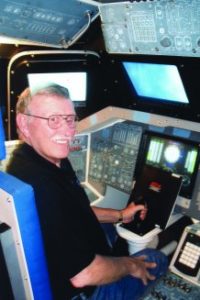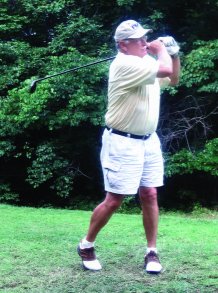Twenty Years Later
 Patrick Prader is celebrating a 20-year anniversary.
Patrick Prader is celebrating a 20-year anniversary.
In the summer of 1987, he was diagnosed only four hours apartwith prostate cancer and sinus cancer.
You sure know how to mess up a fellows weekend, Prader said to one of the doctors.
Youre going to need that sense of humor, the doctor replied.
Prader did use his sense of humor to get him through some extraordinarily difficult times, and both operations were successful. Hes been free of both cancers for 20 years.
Prader did follow-up PSA tests for 15 years. He went every three months for two years and then every six months for ten years. After five years of essentially zero PSA, he wasnt nearly as concerned about waiting to hear the results.
Now, I visit Dr. Catalona once a year, but after 15 years of post surgery non-recurrence, Im excused from PSA testing, Prader said.
Prader is a believer in annual physicals and schedules them routinely. It was during one of those exams that the doctor noticed an enlarged prostate in a digital rectal exam.
PSA testing was not routine 20 years ago, Prader said. That annual physical probably saved my life.
Dr. Catalona visited Prader in the hospital shortly after his sinus cancer operation and told him he had an opening for surgery in three weeks, but he wasnt sure Prader would be physically ready.
 Put me down for it, Prader said.
Put me down for it, Prader said.
He then asked his nurses to increase the volume of food through his feeding tube and he doubled the number of walks doctors prescribed.
Prader doesnt say the initial period of diagnosis and treatment was easy.
I suspect my fears and my concerns were the same as most men: Am I going to make it through this? What is my life going to be like after treatment? What things will I have to change?
For the first couple of years, hed get a nosebleed and worry if the sinus cancer returned. Or his back would hurt and hed wonder if the prostate cancer had recurred.
It does take time to get physically back and even when small things happened, I think it was natural to worry, Prader said.
Still, shortly after the surgeries, he went back to his same job as sales vice-president for a major specialty chemical company and four years later was promoted to president of one of its national subsidiaries.
 I was adventurous before the operations and I still am now. I believe I am living the life I would have been living without the diagnosis.
I was adventurous before the operations and I still am now. I believe I am living the life I would have been living without the diagnosis.
Patrick played golf as soon as his stomach muscles would allow it and organized a golf tour that is still an annual affair today.
What stayed consistent was his strong faith.
I believe in the event of serious illness, a real plus is to have a belief in God that helps to give strength, to fight battles and to believe that things will be okay.
Good friends helped too.
I stayed interested and involved in friends lives. Its one thing to get sick and everybody you know sends a get-well card and then two weeks later, the contact stops. But I had friends who never stopped, and I make sure that Im available long term when my friends need me.
 Retirement was his biggest life altering change. He retired at age 60 11 years after his operations just as he had planned before his diagnoses. He moved back to St. Louis because his five children, nine grandchildren and three great grand children live in the Midwest.
Retirement was his biggest life altering change. He retired at age 60 11 years after his operations just as he had planned before his diagnoses. He moved back to St. Louis because his five children, nine grandchildren and three great grand children live in the Midwest.
He is an avid fisherman and does even more since retirement. He has collections of baseball and golf memorabilia in his home. Given the opportunity to travel in the US and internationally, he readily takes it
Hes president of his community association of 2600 property owners and is on the board of the Urological Research Foundation.
If I feel I can contribute to the community, I try to find the time and energy to do it, Prader said.
One thing did change. Twenty years ago, Prader was not pleased with his initial diagnosis and treatment recommendation for sinus cancer. A second opinion from another surgeon saved an eye the first doctor wanted to remove.
Before that time, I trusted every doctor I saw. From that point forward, Ive always gone for a second opinion, Prader said.
Also, Prader tries to go to a major center for that second opinion.
![]()











